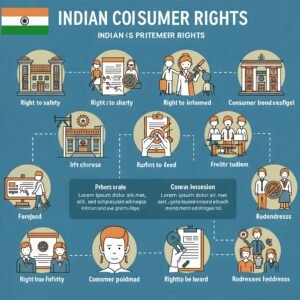 भारतीय उपभोक्ताओं के अधिकार “उपभोक्ता संरक्षण अधिनियम, 2019” के तहत परिभाषित किए गए हैं। यह अधिनियम उपभोक्ताओं को विभिन्न अधिकार प्रदान करता है ताकि वे अनुचित व्यापार प्रथाओं और शोषण से सुरक्षित रहें। नीचे इन अधिकारों को संक्षेप में बताया गया है:
भारतीय उपभोक्ताओं के अधिकार “उपभोक्ता संरक्षण अधिनियम, 2019” के तहत परिभाषित किए गए हैं। यह अधिनियम उपभोक्ताओं को विभिन्न अधिकार प्रदान करता है ताकि वे अनुचित व्यापार प्रथाओं और शोषण से सुरक्षित रहें। नीचे इन अधिकारों को संक्षेप में बताया गया है:-
सुरक्षा का अधिकार: उपभोक्ताओं को उन वस्तुओं और सेवाओं से सुरक्षा का अधिकार है जो उनकी जान, स्वास्थ्य या संपत्ति के लिए हानिकारक हो सकती हैं। उदाहरण के लिए, घटिया गुणवत्ता वाले उत्पादों से बचाव।
-
सूचना का अधिकार: उपभोक्ताओं को किसी भी वस्तु या सेवा की गुणवत्ता, मात्रा, शुद्धता, मानक और कीमत के बारे में पूरी जानकारी प्राप्त करने का अधिकार है ताकि वे सोच-समझकर निर्णय ले सकें।
-
चयन का अधिकार: उपभोक्ताओं को विभिन्न विकल्पों में से अपनी पसंद की वस्तु या सेवा चुनने का अधिकार है। इसका मतलब है कि उन्हें एकाधिकार या सीमित विकल्पों के लिए मजबूर नहीं किया जा सकता।
-
सुनवाई का अधिकार: अगर उपभोक्ता को कोई शिकायत है, तो उसे उचित मंच (जैसे उपभोक्ता अदालत) पर अपनी बात रखने और निष्पक्ष सुनवाई का अधिकार है।
-
निवारण का अधिकार: उपभोक्ता को अनुचित व्यापार प्रथाओं या दोषपूर्ण वस्तुओं/सेवाओं के खिलाफ मुआवजे या नुकसान की भरपाई का अधिकार है। इसमें सामान बदलवाना, पैसे वापस लेना या हर्जाना शामिल हो सकता है।
-
उपभोक्ता शिक्षा का अधिकार: उपभोक्ताओं को अपने अधिकारों और जिम्मेदारियों के बारे में जागरूक होने और शिक्षित करने का अधिकार है ताकि वे शोषण से बच सकें।
कुछ महत्वपूर्ण बातें:
-
उपभोक्ता शिकायत निवारण: उपभोक्ता अपनी शिकायत जिला, राज्य या राष्ट्रीय उपभोक्ता आयोग में दर्ज कर सकते हैं, जो शिकायत के मूल्य और क्षेत्र के आधार पर काम करते हैं।
-
उदाहरण: अगर कोई दुकानदार गलत कीमत वसूलता है या नकली सामान बेचता है, तो उपभोक्ता इसके खिलाफ कार्रवाई कर सकता है।
 rights to consumers so that they are protected from unfair trade practices and exploitation. These rights are briefly explained below:
Right to Safety: Consumers have the right to be protected from goods and services that may be harmful to their life, health or property. For example, protection from substandard products.
Right to Information: Consumers have the right to be fully informed about the quality, quantity, purity, standard and price of any goods or services so that they can make an informed decision.
Right to Choose: Consumers have the right to choose the goods or services of their choice from a variety of options. This means that they cannot be forced into monopolistic or limited choices.
Right to be Heard: If a consumer has a complaint, he has the right to present his case at the appropriate forum (such as a consumer court) and get a fair hearing.
Right to Redressal: A consumer has the right to seek compensation or damages against unfair trade practices or defective goods/services. This may include replacement of goods, refund or compensation.
Right to consumer education: Consumers have the right to be aware and educated about their rights and responsibilities so that they can avoid exploitation.
Some important points:
Consumer grievance redressal: Consumers can file their complaints with the District, State or National Consumer Commission, depending upon the value and area of complaint.
Example: If a shopkeeper charges wrong price or sells fake goods, the consumer can take action against him.
rights to consumers so that they are protected from unfair trade practices and exploitation. These rights are briefly explained below:
Right to Safety: Consumers have the right to be protected from goods and services that may be harmful to their life, health or property. For example, protection from substandard products.
Right to Information: Consumers have the right to be fully informed about the quality, quantity, purity, standard and price of any goods or services so that they can make an informed decision.
Right to Choose: Consumers have the right to choose the goods or services of their choice from a variety of options. This means that they cannot be forced into monopolistic or limited choices.
Right to be Heard: If a consumer has a complaint, he has the right to present his case at the appropriate forum (such as a consumer court) and get a fair hearing.
Right to Redressal: A consumer has the right to seek compensation or damages against unfair trade practices or defective goods/services. This may include replacement of goods, refund or compensation.
Right to consumer education: Consumers have the right to be aware and educated about their rights and responsibilities so that they can avoid exploitation.
Some important points:
Consumer grievance redressal: Consumers can file their complaints with the District, State or National Consumer Commission, depending upon the value and area of complaint.
Example: If a shopkeeper charges wrong price or sells fake goods, the consumer can take action against him.
Author: Ravikant Singh
Drashta' Foundation will organize training programs related to proper management of resources for organizational and collaborative industry. This will reduce the impact of unemployment and provide employment by decentralizing human resources. And in this way, it will establish an ideal society by fulfilling Mahatma Gandhi's concept of self-reliant India.